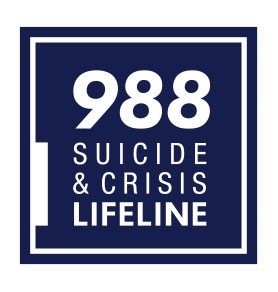*Content Updated January 24, 2024*
Confusion, sadness, anger, and despair are typical responses to the discovery that someone you love has a mental illness. The good news is that effective treatments exist for even the most serious mental health disorders. The sooner you recognize that a mental health problem exists and act to treat it, the better the outcomes and prospects for recovery.
SAFETY FIRST. In any mental health crisis, safety must always be the top priority.

IF YOU ARE IN CRISIS AND NEED IMMEDIATE HELP*
- Call 911 for emergency services.
- Go to the nearest hospital emergency room.
- Call or text 988 to connect with the 988 Suicide & Crisis Lifeline.
The lifeline provides 24-hour confidential support to anyone in suicidal crisis or emotional distress. Support is also available via live chat. Para ayuda en español, llame al 988.
IF YOU HAVE A FAMILY MEMBER OR FRIEND IN CRISIS.
If you have a family member or friend who is suicidal, do not leave him or her alone. Try to get the person to seek help immediately from an emergency room, physician, or mental health professional. Take seriously any comments about suicide or wishing to die. Even if you do not believe your family member or friend will actually attempt suicide, the person is clearly in distress and can benefit from your help in receiving mental health treatment.
*This information is provided by the National Institute of Mental Health (NIMH). Para leer esta información en español, haga clic aquí.
RtoR does not monitor this website for crisis messages or make referrals to crisis or emergency services. If you or someone you know is experiencing a mental health crisis and needs immediate help, call 911 or refer to the NIMH instructions above.
For more information on What To Do in a Crisis, Click here.
When To Be Concerned
Has there been a pronounced, persistent (more than 2 weeks) change in a person’s behavior, moods, thought patterns, self-care, hygiene, or functioning? These changes could be the signs of a mental disorder and an indication to seek help.
Common Warning Signs and Symptoms of a Mental Health Problem
- Confused or unusual thinking
- Prolonged depression (sadness or irritability)
- Rapid mood swings, with extreme highs and lows
- Excessive fears, worries, and anxieties
- Social withdrawal and isolation
- Dramatic changes in eating or sleeping habits
- Delusions or hallucinations; hearing voices
- Growing inability to cope with daily challenges and activities
- Sudden decline in functioning
- Suicidal thoughts
- Increased agitation
- Aggressive, threatening, or abusive behavior
- Intense fear of weight gain
Click here for more warning signs and symptoms from the National Alliance on Mental Illness (NAMI).
If you or someone you know is in need of mental health help, contact a resource specialist for free assistance and support.
Contact a Resource SpecialistWe do not handle crisis calls for mental health emergencies. However, our Resource Specialists can help you or a loved one find mental health resources for support before or after a crisis occurs. For more information about this free service, click here.


